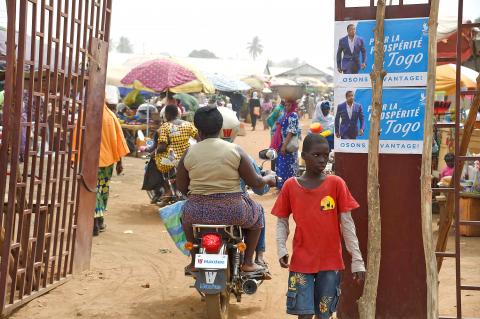When Togolese President Faure Gnassingbe took to the stage for an election rally in the city of Sokode this month, the crowd chanted the campaign’s popular catchphrase: “Knockout blow.”
It was a potent message in a city that was once at the heart of opposition to the Gnassingbe family, which has dominated the West African state for more than half a century.
The 53-year-old leader himself seemed impressed.

Photo: AFP
“How can I not be surprised by the welcome you’re giving me today?” he asked.
Through 2017 and 2018, huge protests rocked the nation of 8 million people as demonstrators demanded the incumbent, who took power in 2005 after the death of his father, leave office.
Sokode, Togo’s second-largest city, was the hotbed for the unrest.
Spearheaded by little-known local politician Tikpi Atchadam and his Pan-African National Party (PNP), protesters blocked roads, torched police stations and attacked soldiers.
The response from the authorities was fierce — at least 10 people were killed in Sokode alone.
More than a year after the nationwide protests fizzled out, Gnassingbe’s grip appears as solid as ever.
He is almost certain to win a fourth term in Saturday’s election, and has changed the constitution to allow himself potentially to stay in charge until 2030.
People were brought in on buses from surrounding villages for his rally in Sokode, and schools were closed for the day and students pushed to attend.
“Every time we use violence in order to oppose ... it is always Togo that loses out,” the president told the crowd of thousands.
Sokode Mayor Ouro Gbele Tchanile said that “peace has returned” to his city for good.
However, in reality, Sokode is a city still under lockdown.
Trucks filled with armed soldiers continually patrol the main streets, and residents complain of searches in their homes, beatings in the streets and a nightly curfew.
“Whoever wants peace has to prepare for war,” the mayor said in his office. “Tourism stopped, business suffered a lot — development is not possible without security.”
The neighborhood of Kpalo-Kpalo, one of the PNP’s former strongholds, is surrounded by troops.
Supporters of the party — which drew a lot of its support from the mainly Muslim Tem ethnic group — said a crackdown by security forces means that they can only meet in secret.
Their leader Atchadam has fled Togo and is hiding out in Ghana.
“We are not safe anywhere, we live in hiding, we cannot speak out,” a PNP supporter said on condition of anonymity. “I am one of the few who can talk to you, as most of us have been arrested.”
Since November last year, about 50 people have been arrested in a series of publicized operations by the security forces.
Civil groups backed by charity Catholic Relief Services are nonetheless looking to build on the fragile peace in the city.
In an initiative spearheaded by the Catholic Church, they have brought together members of different communities, religious groups and the security forces.
“The elections are the business of the politicians. We are trying to build a climate of peace before and after,” Bishop of Sokode Celestin-Marie Gaoua said. “It is our youth who end up being sacrificed for the sake of politics.”

ANGER: A video shared online showed residents in a neighborhood confronting the national security minister, attempting to drag her toward floodwaters Argentina’s port city of Bahia Blanca has been “destroyed” after being pummeled by a year’s worth of rain in a matter of hours, killing 13 and driving hundreds from their homes, authorities said on Saturday. Two young girls — reportedly aged four and one — were missing after possibly being swept away by floodwaters in the wake of Friday’s storm. The deluge left hospital rooms underwater, turned neighborhoods into islands and cut electricity to swaths of the city. Argentine Minister of National Security Patricia Bullrich said Bahia Blanca was “destroyed.” The death toll rose to 13 on Saturday, up from 10 on Friday, authorities

Two daughters of an Argentine mountaineer who died on an icy peak 40 years ago have retrieved his backpack from the spot — finding camera film inside that allowed them a glimpse of some of his final experiences. Guillermo Vieiro was 44 when he died in 1985 — as did his climbing partner — while descending Argentina’s Tupungato lava dome, one of the highest peaks in the Americas. Last year, his backpack was spotted on a slope by mountaineer Gabriela Cavallaro, who examined it and contacted Vieiro’s daughters Guadalupe, 40, and Azul, 44. Last month, the three set out with four other guides

Local officials from Russia’s ruling party have caused controversy by presenting mothers of soldiers killed in Ukraine with gifts of meat grinders, an appliance widely used to describe Russia’s brutal tactics on the front line. The United Russia party in the northern Murmansk region posted photographs on social media showing officials smiling as they visited bereaved mothers with gifts of flowers and boxed meat grinders for International Women’s Day on Saturday, which is widely celebrated in Russia. The post included a message thanking the “dear moms” for their “strength of spirit and the love you put into bringing up your sons.” It

DISASTROUS VISIT: The talks in Saudi Arabia come after an altercation at the White House that led to the Ukrainian president leaving without signing a minerals deal Ukrainian President Volodymyr Zelenskiy was due to arrive in Saudi Arabia yesterday, a day ahead of crucial talks between Ukrainian and US officials on ending the war with Russia. Highly anticipated negotiations today on resolving the three-year conflict would see US and Ukrainian officials meet for the first time since Zelenskiy’s disastrous White House visit last month. Zelenskiy yesterday said that he would meet Saudi Arabian Crown Prince Mohammed bin Salman, the nation’s de facto leader, after which his team “will stay for a meeting on Tuesday with the American team.” At the talks in the Red Sea port city of Jeddah, US